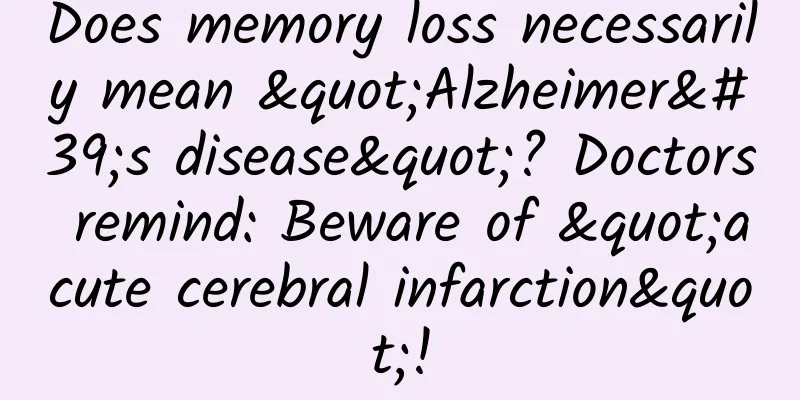Does memory loss necessarily mean "Alzheimer's disease"? Doctors remind: Beware of "acute cerebral infarction"!

|
As usual, Grandpa Zhang got up early this morning and went out to buy vegetables. When he walked out of the community gate, he suddenly forgot how to get to the vegetable market. The environment around him became very unfamiliar. He was very scared and stood there in a daze, not knowing what to do for a moment. When his friends saw him, they quickly helped him call his son. Immediately, the family brought Grandpa Zhang to the Hunan Provincial Second People's Hospital (Provincial Brain Hospital) for treatment. The attending physician found that Grandpa Zhang's condition was complicated, so he suggested that he go through the hospitalization procedures and stay in the Second Ward of the Department of Neurology. He completed relevant laboratory tests and a head MRI showed an acute infarction lesion in the left temporal lobe. Zhou Nina, director of the Second Department of Cerebrovascular Disease Neurology and chief physician , explained that Grandpa Zhang's illness was called acute cerebral infarction. Cerebral infarction, also known as ischemic stroke, refers to a clinical syndrome in which local brain tissue blood supply is disturbed due to various reasons, leading to ischemia and hypoxic necrosis of brain tissue, and the corresponding neurological deficits appear rapidly. At present, stroke has become the leading cause of death in China. The annual death toll from stroke exceeds 2 million, with an annual growth rate of 8.7%. Three-quarters of surviving stroke patients in the country suffer from varying degrees of disability. The socioeconomic burden of stroke in my country is as high as 40 billion yuan each year. Ischemic stroke (cerebral infarction) accounts for nearly 70% of strokes. 1. CausesThe main cause of cerebral infarction is atherosclerosis of blood vessels in the brain and neck caused by various reasons; its risk factors include heredity, hypertension, diabetes, hyperlipidemia, smoking, etc. These factors can cause damage to the arterial walls and obstruct blood flow, leading to cerebral infarction. 2. Clinical manifestationsThe early symptoms of cerebral infarction are diverse and can be simply summarized as follows: BE FAST principle (BE FAST Chinese literal translation: hurry up)! Let everyone recognize stroke as soon as possible: B— balance: Sudden headache and dizziness, leading to difficulty walking, crooked walking, etc.; E— —eyes: Sudden onset of unilateral or bilateral vision difficulties or blackouts; F— —face: The corners of the mouth suddenly become crooked, the nasolabial folds disappear, etc. A— —arm: Sudden weakness and numbness on one side of the limb, making it difficult to lift it; S— —speech: Sudden slurred speech or inability to understand what others are saying; T— time: If one or more of the above five symptoms appear, especially in high-risk groups such as patients with three highs, you must call the emergency number and seek medical treatment in time! 3. TreatmentOnce a stroke occurs, you need to go to the nearest stroke center, stroke screening and prevention base hospital, or other medical institutions with stroke treatment capabilities as soon as possible to receive standardized treatment. The best time to treat acute cerebral infarction is called the time window. The current time window for intravenous thrombolysis is within 4.5 hours of onset. Carrying out intravenous thrombolysis and intravascular treatment (thrombectomy) within the time window is currently the most effective treatment measure. In addition, you cannot give up if the time window is exceeded. Within 24 hours of onset, dual antiplatelet drugs (such as aspirin and clopidogrel) should be started and maintained for 3 weeks, followed by long-term oral administration of single antiplatelet drugs (such as aspirin or clopidogrel). According to the 2021 stroke guidelines, patients with ischemic stroke should receive lipid-lowering and plaque-stabilizing treatments during the acute phase of the disease, combined with treatments to improve collateral circulation and scavenge oxygen free radicals. Rehabilitation and psychological support are also particularly important. 4. Prevention of cerebral infarctionMany risk factors for stroke are interventionable, treatable and controllable. Therefore, developing a healthy lifestyle and actively managing risk factors for people at high risk of stroke can help everyone stay away from stroke. 1. Control blood pressure When systolic blood pressure is greater than 160 mmHg and diastolic blood pressure is greater than 95 mmHg, the risk of "cerebral infarction" will increase significantly. Therefore, patients with hypertension should check their medication, monitor their blood pressure regularly, keep their blood pressure within the normal range for a long time, and prevent sudden increases or decreases in blood pressure. 2. Control blood lipids For every 1mmol/L increase in total cholesterol, the risk of "cerebral infarction" increases by 25%. Therefore, patients with hyperlipidemia should actively cooperate with doctors for lipid-lowering treatment, take lipid-lowering drugs scientifically, and strictly control their daily diet. 3. Control blood sugar The probability of "cerebral infarction" in diabetic patients is 1.8-6.0 times that of normal people. Therefore, diabetic patients must actively control blood sugar to avoid the problem of high blood sugar. 4. Healthy living habits In daily life, we should develop good habits. According to our own preferences and physical conditions, we should choose appropriate physical exercises. It is recommended to do more than 150 minutes of moderate-intensity aerobic exercise per week. We should eat low-salt, low-calorie, and low-fat foods as much as possible, eat more fresh fruits and vegetables, avoid excessive intake of sodium salt, eat less butter, fat, animal offal, candy, etc., and do not overeat. We should quit smoking and drinking; we should ensure adequate sleep time and regular work and rest every day; we should maintain a healthy, positive and optimistic attitude. 5. Drug prevention For people who are at risk of "cerebral infarction", they can take antiplatelet drugs or anticoagulant drugs, such as aspirin and warfarin, for a long time under the guidance of a doctor, so as to effectively reduce the possibility of thrombosis; regularly perform electrocardiograms, carotid artery ultrasound, intracranial angiography and other examinations to promptly detect potential "cerebral infarction" risks, and take effective intervention measures in time to nip the "cerebral infarction" risks in the bud. Grandpa Zhang's son was puzzled as to why his father had a bad memory and also suffered a cerebral infarction. Director Zhou Nina patiently explained: Cerebral infarction has many manifestations, limb weakness, slurred speech and other symptoms are common manifestations. Other sudden symptoms of neurological deficits, including decreased memory and intelligence, sudden hearing loss, etc. are also very likely to be acute cerebral infarction and must be treated promptly. Because acute cerebral infarction may be complicated by vascular dementia, which may also occur within half a year of acute cerebral infarction, its treatment principles, efficacy and prognosis are different from those of Alzheimer's disease. Through active treatment, memory and intelligence may be better restored, improving the patient's quality of life and reducing the burden on family and society!
(Edited by YT) |
Recommend
What causes varicose veins during pregnancy?
Varicose veins may occur during pregnancy. This i...
Tips for saving money on Singles’ Day: These 4 snacks are all “pseudo-healthy” foods, don’t buy them for your children
Double Eleven Shopping I have saved a lot of coup...
GDC: Survey shows European mobile game developers prefer Android platform
Recently, the game developer organization GDC con...
Can my aunt eat strawberries?
Female friends need to pay attention to their die...
Why does a woman always have brown discharge from her private parts?
The female private parts are very important parts...
What are the symptoms of postpartum damp heat
Postpartum damp heat is also relatively common. I...
What are the common types of gynecological diseases?
In daily life, women should pay attention to body...
Is moderate cervical erosion difficult to treat?
Many women usually have some gynecological proble...
Spring is the right time to lose weight, but how can you effectively reduce excess fat in your body?
With the end of winter, many people are planning ...
Treatment of endometrial thickening 14mm
The uterus is an important reproductive organ for...
Reasons for missing menstruation for several months
In fact, in life, today's female friends are ...
Why do girls urinate frequently?
There are many reasons why girls urinate frequent...
What seasonings should be added to fried fish nuggets to make them golden brown?
We all know that there are many ways to eat fish,...









